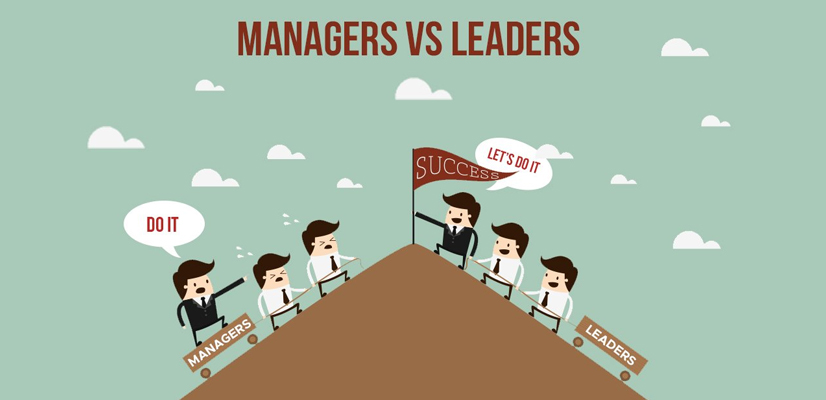Within any organization, if you have a managerial position you may think of yourself as a leader. Managers plan short-term goals, delegate tasks among the team members, resolve issues in the organization and implement policy. Leaders encourage their team to achieve heights in their life.
Fundamentals of Management
Management is about getting things done in daily life, managing workflow, projects, and performance and leadership needs a thoughtful perspective and a strategy for the future. Managers get people to follow rules and regulations to reduce risk and produce desirable results. Managers see change as a risk that needs to be minimized as much as possible.
Fundamentals of Leadership
The principle of leadership is you don’t have to manage others directly to be a leader. The impact of any leader doesn’t come from his job title but the influence she creates by believing in others, empowering them to do significant work that matches their core strengths, and challenging them to expand in new areas.
Leaders view changes as an opportunity and inspire others to take risks to do something new and that is what is required in the pursuit of transformation. They help others recognize their skills, strengths, and leadership capacity by guiding their work.
Leading and Managing are two different roles that multiple orientations and skills. Here are some of the ways you can evolve from a manager to a leader :-
- Be open to feedback
The first step to becoming a leader is to constantly ask for feedback. Whenever there is any constructive criticism, communicate with the team members about it. Make the workplace an environment to openly discuss the issues. This will create an engaged workforce who
Allow your team to discuss opinions and understand their point of view. Asking visionary questions to your employees will encourage the feedback system. It will also demonstrate that you listen to your employees carefully and care about their perspectives.
- Stop Micromanaging
Don’t try to personally control and monitor your team members extensively. Everyone needs feedback on the work they do. You must let the team members know their tasks, how to do it continuously for some time. Empower your employees to experiment with their opinions and test new solutions to a particular problem.
Instead of providing immediate feedback understand the requirements of your team members and then give them feedback.
- Respond timely
A leader provides feedback timely to their team members so they can perform better. Annual reviews are important but along with that employees also need regular feedback for their personal and business growth. It helps employees understand whether their ideas worked for a project or not.
Managers should take out the time to give feedback at regular intervals. To evolve from manager to leader, you must build trust with your team members. If you hold back the information or tell something, you could compromise your relationships.
- Adopt Strategic Thinking
Strategic thinking is the ability to shift through various levels of analysis, recognize patterns, and build mental business models. Managers should make a business strategy such that along with achieving long-term plans they can also explain to employees what roles they play in reaching company goals.
A leader monitors the staff members and other organizational units to achieve specific goals. You must encourage employees to give suggestions for a task and observe the organizational expenditure along the way. For example, You and your employees should together study overhead costs, like in printing, looking for the core causes of wasting paper and toners and work on how to reduce it.
Being close to day-to-day operations and your team members lets you adapt changes easily which can make your customers more satisfied.
- Develop your emotional intelligence
Great leaders understand the individuals around them and have a great level of inspiration, social skills, self-awareness, empathy and self-regulation. Develop your emotional intelligence by reflecting upon how you behave with your team members and react to circumstances around you.
Practising responding after understanding the whole situation rather than reacting immediately can build the strong foundation of trust, positive attitude, and respect among your staff members.
Both managers and leaders create focus and structure. Leaders create the core elements of culture. They promote the culture which strengthens the building, collaborating, elaborating, and persuading processes which creates a vibrant and productive culture in the organization. Progressing into your leadership self means realizing the importance of your role and the value that you bring to the whole team.





